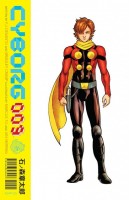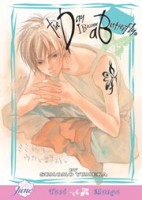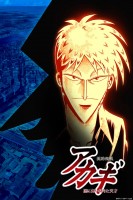My News and Reviews
There were a few different things going on at Experiments in Manga last week. First off is the Arisa manga giveaway. The winner will be announced on Wednesday, so you still have a little time to enter for a chance to win the first and eleventh volumes of Natsumi Ando’s Arisa. The most recent Library Love feature was posted last week, too, which is basically a collection of quick takes of manga that I’ve borrowed from my local library. My quest to read all of Edogawa Rampo’s material available in English also continued. This time I took a look at The Edogawa Rampo Reader, which is a nice introduction to his life and work. The volume collects eighteen of his short stories and essays from over a span of thirty years.
A few interesting things found online: Brigid Alverson interviewed Charles Brownstein of the Comic Book Legal Defense Fund about its new manga guide which will be released later this year. (I reviewed Manga: Introduction, Challenges, and Best Practices not too long ago and found it to be a great resource.) And speaking of the CBLDF, Keiji Nakazawa’s Barefoot Gen was recently highlighted as part of the Using Graphic Novels in Education feature. Finally, Vertical made some licensing announcements at Anime Weekend Atlanta: Tetsuya Tsutui’s manga Prophecy (interestingly enough, Tsutui approached Vertical directly about the license) and Shinobu Hashimoto’s biographical novel Compound Cinematics: Akira Kurosawa and I.
Quick Takes
 Arisa, Volumes 8-11 by Natsumi Ando. The true King has been revealed! As has that person’s motivations and back story, which are suitably dark and dramatic. Arisa and its characters are all pretty twisted—the King isn’t the only one with serious issues. The most stable character in Arisa is probably Tsubasa, but sometimes I wonder about her, too. It’s not just anyone who would pretend to be someone else, after all. At times Arisa can be extraordinarily over the top with its action and melodrama, but that’s probably one of the reasons I find the series so absorbing. Some of it comes across as unintentionally ridiculous, though. But for every development that’s laughable, there’s another that is effectively disturbing. Arisa is a series that’s really easy to tear through. Despite all of the twists and turns in its plot (or maybe because of them) the manga reads very quickly. With only one volume left to go in the series, I’m very curious to see how things will play out.
Arisa, Volumes 8-11 by Natsumi Ando. The true King has been revealed! As has that person’s motivations and back story, which are suitably dark and dramatic. Arisa and its characters are all pretty twisted—the King isn’t the only one with serious issues. The most stable character in Arisa is probably Tsubasa, but sometimes I wonder about her, too. It’s not just anyone who would pretend to be someone else, after all. At times Arisa can be extraordinarily over the top with its action and melodrama, but that’s probably one of the reasons I find the series so absorbing. Some of it comes across as unintentionally ridiculous, though. But for every development that’s laughable, there’s another that is effectively disturbing. Arisa is a series that’s really easy to tear through. Despite all of the twists and turns in its plot (or maybe because of them) the manga reads very quickly. With only one volume left to go in the series, I’m very curious to see how things will play out.
 Black Jack, Volumes 7-9 by Osamu Tezuka. Every once in a while I get the urge to read a bunch of Black Jack. Since the series is fairly episodic, it’s easy to pick up even if it’s been a while since I’ve read any of the manga. There were a couple of things that particularly struck me about these volumes. First of all, Black Jack should really stay away from cliffs as he seems to have a habit of falling off of them. Secondly, since Black Jack is an unlicensed doctor, it probably shouldn’t be too surprising that he would have a tendency to become involved with criminals. Often this works out quite well for him—he is able to demand his high prices and the other parties want to keep things quiet, too. However, on occasion Black Jack’s association with organized crime comes back to bite him and he ends up a little worse for wear. As always, I adore Black Jack as a character. I enjoy how much of a bastard he can be while still maintaining a strong sense of integrity.
Black Jack, Volumes 7-9 by Osamu Tezuka. Every once in a while I get the urge to read a bunch of Black Jack. Since the series is fairly episodic, it’s easy to pick up even if it’s been a while since I’ve read any of the manga. There were a couple of things that particularly struck me about these volumes. First of all, Black Jack should really stay away from cliffs as he seems to have a habit of falling off of them. Secondly, since Black Jack is an unlicensed doctor, it probably shouldn’t be too surprising that he would have a tendency to become involved with criminals. Often this works out quite well for him—he is able to demand his high prices and the other parties want to keep things quiet, too. However, on occasion Black Jack’s association with organized crime comes back to bite him and he ends up a little worse for wear. As always, I adore Black Jack as a character. I enjoy how much of a bastard he can be while still maintaining a strong sense of integrity.
 Cyborg 009 written by F. J. DeSanto and Bradley Cramp and illustrated by Marcus To and Ian Herring. Working closely with Ishimori Productions, Cyborg 009 is a single-volume, hardcover graphic novel adapting Shotaro Ishinomori’s Cyborg 009 manga with a Western audience in mind published by Archaia. The comic is in full-color with updated character designs closer to some of the more recent anime adaptations than the original manga. Actually, the artwork was one of my favorite things about the Cyborg 009 graphic novel. Story-wise it would have benefited from either being a little more focused or a little bit longer. As it is, the graphic novel is very compressed and not all of the plot lines introduced are adequately developed. But it is fun and quickly paced, not to mention beautifully presented; hopefully it will encourage readers to seek out the original material. Also of note: the back cover indicates that Cyborg 009 is “Ishimori Universe Book 1.” I know that I’d be very interested in seeing more collaborations between Archaia and Ishimori.
Cyborg 009 written by F. J. DeSanto and Bradley Cramp and illustrated by Marcus To and Ian Herring. Working closely with Ishimori Productions, Cyborg 009 is a single-volume, hardcover graphic novel adapting Shotaro Ishinomori’s Cyborg 009 manga with a Western audience in mind published by Archaia. The comic is in full-color with updated character designs closer to some of the more recent anime adaptations than the original manga. Actually, the artwork was one of my favorite things about the Cyborg 009 graphic novel. Story-wise it would have benefited from either being a little more focused or a little bit longer. As it is, the graphic novel is very compressed and not all of the plot lines introduced are adequately developed. But it is fun and quickly paced, not to mention beautifully presented; hopefully it will encourage readers to seek out the original material. Also of note: the back cover indicates that Cyborg 009 is “Ishimori Universe Book 1.” I know that I’d be very interested in seeing more collaborations between Archaia and Ishimori.
 The Day I Become a Butterfly by Sumomo Yumeka. Although The Day I Become a Butterfly was released under Digital Manga’s Juné imprint, two of the six collected stories aren’t at all boys’ love and a few of the others could be argued not to be as well. Yumeka describes the short manga in The Day I Become a Butterfly as inexplicable (she also admits to not liking them), but I think I would call them poetic. Instead of being straightforward narratives, the stories are quiet and almost impressionistic. They tend to be fairly introspective and melancholy; the desire for acceptance from others is a recurring theme throughout the volume. Yumeka’s artwork is lovely, although some of the character designs seem to be reused from one story to the next. Normally this might not be much of a problem, but because some of the stories in The Day I Become a Butterfly are interrelated it was sometimes confusing when the characters from an unrelated story looked like some of the recurring characters.
The Day I Become a Butterfly by Sumomo Yumeka. Although The Day I Become a Butterfly was released under Digital Manga’s Juné imprint, two of the six collected stories aren’t at all boys’ love and a few of the others could be argued not to be as well. Yumeka describes the short manga in The Day I Become a Butterfly as inexplicable (she also admits to not liking them), but I think I would call them poetic. Instead of being straightforward narratives, the stories are quiet and almost impressionistic. They tend to be fairly introspective and melancholy; the desire for acceptance from others is a recurring theme throughout the volume. Yumeka’s artwork is lovely, although some of the character designs seem to be reused from one story to the next. Normally this might not be much of a problem, but because some of the stories in The Day I Become a Butterfly are interrelated it was sometimes confusing when the characters from an unrelated story looked like some of the recurring characters.
 Akagi, Episodes 1-13 directed by Yuzo Sato. I love mahjong and Akagi is one of the mahjong series. I was thrilled when Crunchyroll picked up the anime for streaming. (I hold no illusions—mahjong manga and anime is very niche and unlikely to ever receive a physical release in North America.) Watching Akagi has actually improved my game a bit. It has also taught me how to cheat…not that I would. People who are at least vaguely familiar with mahjong will probably get more out of Akagi than those who aren’t, but it’s not necessary to understand the minutia of mahjong to enjoy the anime. The series can be surprisingly brutal at times and the games are intense—high stakes, crooked cops, yakuza, violence, manipulation. A huge emphasis is put on the psychological elements of the game. Akagi is a brilliant player and absolutely ruthless, both at the table and away from it. He seems to be afraid of nothing and is extremely ballsy. I’m really looking forward to watching the series’ second half.
Akagi, Episodes 1-13 directed by Yuzo Sato. I love mahjong and Akagi is one of the mahjong series. I was thrilled when Crunchyroll picked up the anime for streaming. (I hold no illusions—mahjong manga and anime is very niche and unlikely to ever receive a physical release in North America.) Watching Akagi has actually improved my game a bit. It has also taught me how to cheat…not that I would. People who are at least vaguely familiar with mahjong will probably get more out of Akagi than those who aren’t, but it’s not necessary to understand the minutia of mahjong to enjoy the anime. The series can be surprisingly brutal at times and the games are intense—high stakes, crooked cops, yakuza, violence, manipulation. A huge emphasis is put on the psychological elements of the game. Akagi is a brilliant player and absolutely ruthless, both at the table and away from it. He seems to be afraid of nothing and is extremely ballsy. I’m really looking forward to watching the series’ second half.

YEah I rember Day I became A Butterfly when I was still dipping my toe into BL and Yaoi it was one of my “i’ll get around to it titles”, and I never did because I than shortly just went “yeah not a sub genre for me”.
I now say Lutefisk to me maybe if I was in that subculutre I’d like it but not being part of it I’ll never really develop a taste for it despite the “cross pollination” that happens in Otaku and Fujoshi subcultures.